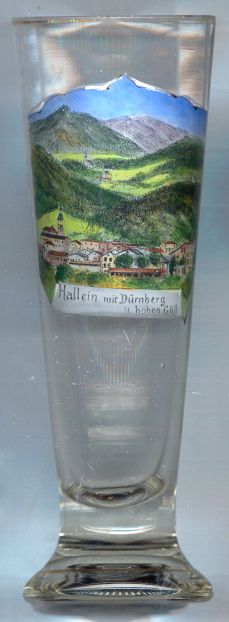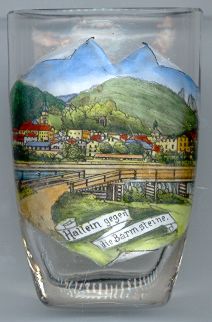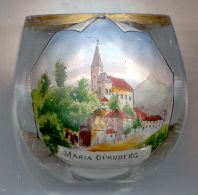

|
| ÖSTERREICH | AUSTRIA |
| Bundesland: Salzburg | |
| Bezirk: Hallein |

 Hallein, the administrative centre of the Tennengau region, is situated at an elevation of 480 m on the river Salzach just 15 km south of Salzburg.
The saline spring at the Dürrnberg mountain [left] must have been known already about 2,500 BC.
Underground mining for salt began during the Iron Age, around 600 BC. The settlement at the Dürrnberg soon became one of the most
important centre of Celtic culture. However, when the Celtic kingdom of Noreia was incorporated into the Roman Empire in 15 BC, salt production and trading
ended and the place was abandoned. It took more than 1,000 years until salt production was started again by the archbishops of Salzburg in the mid-12th century
(the first documented mention of salt production dates from 1191). The new settlement in the valley below at the river Salzach was first mentioned in 1198 and in the first half
of the 13th century became known as Hallein (which in fact is derived from the Celtic word hal for salt). Hallein soon became one of the most important
sources of the wealth of the archbishops and their residence city, Salzburg. Hallein itself obtained the status of a town between 1218 and 1236.
The old town centre still preserves most of the medieval houses that were built
until about 1500. Even parts of the old fortifications of prior to 1300 are still intact. Later, the Baroque era has left its traces in the historic old town, which today is
still completely intact. After the Napoleonic Wars, the archdiocese of Salzburg ceased to be an independent state and in 1816 was incorporated into the Austrian Empire.
After that, Hallein was only one of several places of salt production and soon lost its economic position that it had enjoyed during the times of the archbishops' monopole on salt trading.
In modern times, the saline springs at Dürrnberg (elevation 850 m) became a spa which was officially recognized in 1954 (Bad Dürrnberg, today part of the municipality of Hallein).
Salt production at Hallein was stopped in 1989. The old mines at the Dürrnberg have been converted into a museum and now can be visited by tourists.
Hallein, the administrative centre of the Tennengau region, is situated at an elevation of 480 m on the river Salzach just 15 km south of Salzburg.
The saline spring at the Dürrnberg mountain [left] must have been known already about 2,500 BC.
Underground mining for salt began during the Iron Age, around 600 BC. The settlement at the Dürrnberg soon became one of the most
important centre of Celtic culture. However, when the Celtic kingdom of Noreia was incorporated into the Roman Empire in 15 BC, salt production and trading
ended and the place was abandoned. It took more than 1,000 years until salt production was started again by the archbishops of Salzburg in the mid-12th century
(the first documented mention of salt production dates from 1191). The new settlement in the valley below at the river Salzach was first mentioned in 1198 and in the first half
of the 13th century became known as Hallein (which in fact is derived from the Celtic word hal for salt). Hallein soon became one of the most important
sources of the wealth of the archbishops and their residence city, Salzburg. Hallein itself obtained the status of a town between 1218 and 1236.
The old town centre still preserves most of the medieval houses that were built
until about 1500. Even parts of the old fortifications of prior to 1300 are still intact. Later, the Baroque era has left its traces in the historic old town, which today is
still completely intact. After the Napoleonic Wars, the archdiocese of Salzburg ceased to be an independent state and in 1816 was incorporated into the Austrian Empire.
After that, Hallein was only one of several places of salt production and soon lost its economic position that it had enjoyed during the times of the archbishops' monopole on salt trading.
In modern times, the saline springs at Dürrnberg (elevation 850 m) became a spa which was officially recognized in 1954 (Bad Dürrnberg, today part of the municipality of Hallein).
Salt production at Hallein was stopped in 1989. The old mines at the Dürrnberg have been converted into a museum and now can be visited by tourists.
The  parish and deanery church Sankt Antonius [bottom left] in Hallein was first mentioned in 1347.
The chancel dates from the Late Gothic period, the nave was built in Classicist style in 1769–1775.
The church tower from the Late Romanesque period collapsed in 1945; it was replaced by a new, modern tower in 1965.
A beloved tourist attraction is the grave of Franz Xaver Gruber (1787–1863), located next to the church. Gruber was teacher at the primary school at
Oberndorf and is world-famous as composer of the Christmas song "Stille Nacht, heilige Nacht" (Silent Night, Holy Night), which was first performed at Oberndorf in 1816.
From 1833, Gruber was organist at the deanery church of Hallein.
parish and deanery church Sankt Antonius [bottom left] in Hallein was first mentioned in 1347.
The chancel dates from the Late Gothic period, the nave was built in Classicist style in 1769–1775.
The church tower from the Late Romanesque period collapsed in 1945; it was replaced by a new, modern tower in 1965.
A beloved tourist attraction is the grave of Franz Xaver Gruber (1787–1863), located next to the church. Gruber was teacher at the primary school at
Oberndorf and is world-famous as composer of the Christmas song "Stille Nacht, heilige Nacht" (Silent Night, Holy Night), which was first performed at Oberndorf in 1816.
From 1833, Gruber was organist at the deanery church of Hallein.
The mountain in the background [left, no. 1165: background right] of the picture on glass no. 1165 [left]
is the  Hoher Göll (2,522 m).
Hoher Göll (2,522 m).
The background of the picture of glass no. 1330 [far right] shows the
 Barmsteine
Barmsteine

The  pilgrimage church Maria Dürrnberg [near left] in Bad Dürrnberg was
first mentioned in 1434. The present church was built in 1594–1612 in Renaissance and Early Baroque style.
Only red marble was used for the construction.
The wooden statue of Our Lady dates from 1612.
pilgrimage church Maria Dürrnberg [near left] in Bad Dürrnberg was
first mentioned in 1434. The present church was built in 1594–1612 in Renaissance and Early Baroque style.
Only red marble was used for the construction.
The wooden statue of Our Lady dates from 1612.
![[scale]](lineal.jpg)